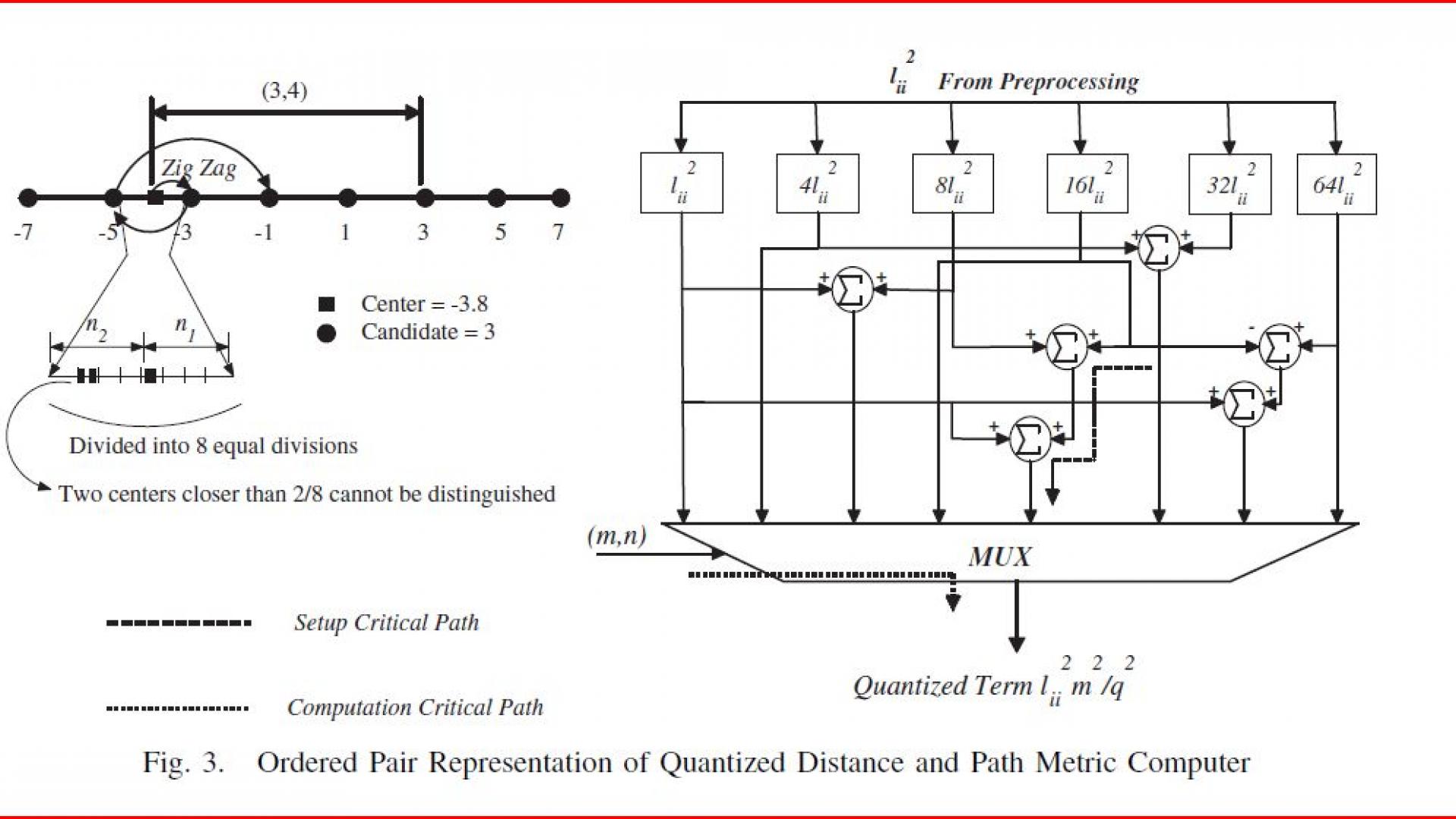Multiple Input Multiple Output (MIMO) wireless communication has shown great promise for future communications systems as they achieve very high spectral efficiency. However, practical realizations of MIMO wireless communication systems have been limited by their difficulty of implementation. The major bottleneck is the computational complexity of the Maximum Likelihood (ML) detection problem, especially for arrays with a large number of transmit and receive elements. This reality motivated researchers to consider other suboptimal approaches for MIMO decoding, such as Zero Forcing (ZF), Minimum Mean Square Error (MMSE), VBLAST etc, all of which vary in performance and complexity. Recently, there has been significant research activity in K-best Sphere decoders as a means of achieving close to ML solutions with lower complexity.
Many algorithmic developments and VLSI implementations have been reported in literature with widely varying performance to area and power metrics. we present a holistic view of different Sphere decoding techniques and K-best decoding techniques, identifying the key algorithmic and implementation trade-offs. We establish a consistent benchmark framework to investigate and compare the delay cost, power cost, and power-delay-product cost incurred by each method. Finally, using the framework, we propose a novel architecture and compare that to other published approaches. Our goal is to explicitly elucidate the overall advantages and disadvantages of each proposed algorithms in one coherent framework.
Team members: Dr. Sudip Mondal and Chung-Ann Shen
Collaborators: Prof. Ahmed Eltawil
References:
- Chung-An Shen, Ahmed M. Eltawil, Sudip Mondal and Khaled N. Salama “A Best-First Soft/Hard Decision Tree Searching MIMO Decoder,” IEEE transactions on on Very Large Scale Integration Systems (TVLSI) (in press)
- Sudip Mondal, Ahmed M. Eltawil, Chung-An Shen and K. N. Salama, “Design and Implementation of a Sort Free K-Best Sphere Decoder ,” IEEE Transactions on Very Large Scale Integration Systems (TVLSI), Vol. 18, No. 10, pp.1497-1501, 2010
- C.-A. Shen, A. M. Eltawil, and K. N. Salama, “Evaluation framework for K-Best sphere decoders,” Jour. of Circuits, Systems, and Computers, vol. 19, pp. 975–995, 2010.
- Sudip Mondal, Ahmed M. Eltawil, and Khaled N. Salama, "Architectural Optimizations for Low-Power K-Best MIMO Decoders," IEEE Transactions on Vehicular Technologies, Volume 58, Issue 7, Page(s):3145 – 3153, Sept. 2009.
- Chung-An Shen, Ahmed M. Eltawil, Sudip Mondal and Khaled N. Salama “A Best-First Tree-Searching Approach for ML Decoding in MIMO System,” IEEE International Symposium on Circuits and Systems (ISCAS), pp.3533-3536, August 2010, Paris, France
- S. Mondal, K. N. Salama and A Eltawil, “On the VLSI Implementation of low complexity K-best MIMO decoders,” International Conference on Microelectronics, pp. 337–340, 2008
- S. Mondal, and K. Salama, “Efficient Enumeration in 2D spaces,” International Conference on Microelectronics, pp. 395–398, 2008
- S. Mondal, W. Ali and K. Salama, “A Novel Approach for K-Best MIMO Detection and its VLSI Implementation,” International Symposium on Circuits and Systems (ISCAS’08), pp. 936-939, Seattle, Washington, May 2008
- S. Mondal, S. Gouda, T. Zhang and K.N. Salama, “Novel PSK enumeration for effieicnt VLSI implementation of MIMO detection,” Midwest symposium on circuits and systems (MWSCAS 2007), pp. 1233-1236, August 2007
This material is presented to ensure timely dissemination of scholarly and technical work. Copyright and all rights therein are retained by authors or by other copyright holders. All persons copying this information are expected to adhere to the terms and constraints invoked by each author's copyright. In most cases, these works may not be reposted without the explicit permission of the copyright holder. ©20xx IEEE. Personal use of this material is permitted. However, permission to reprint/republish this material for advertising or promotional purposes or for creating new collective works for resale or redistribution to servers or lists, or to reuse any copyrighted component of this work in other works must be obtained from the IEEE.
